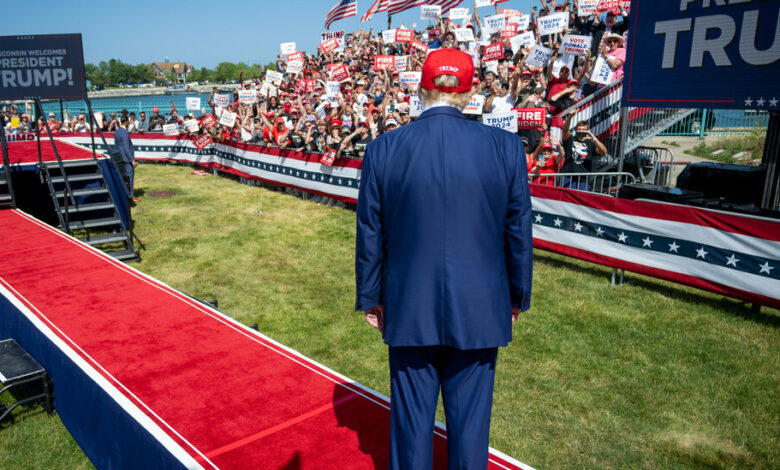How Billionaires Are Reshaping the Presidential Race

Billionaires vs. Billionaires
Donald Trump has quickly erased his financial disadvantage against President Biden, outscoring his Democratic rival for the second month in a row. That fundraising was made possible by a cabal of wealthy supporters who donated millions shortly after the former president was convicted of 34 crimes in New York.
But wealthy donors still continue to give to Biden, and his campaign has used its big early financial advantage to build a political machine in key contested states. That means success in November will depend in part on which side can continue to tap its billionaire backers for money.
The numbers: Trump and the Republican National Committee raised $141 million last month, compared to Biden and the Democratic National Committee’s $85 million. And a partial count yesterday showed that Trump and the RNC had a war chest of at least $170 million, compared to $212 million for Biden and the DNC.
Rich conservatives are no longer deterred. Chief among them last month was Timothy Mellon, an heir to the Mellon fortune who donated $50 million to a pro-Trump super PAC. Shortly after receiving the money, the super PAC booked $100 million in advertising through Labor Day.
It reminds us that many donors have overcome their doubts about Trump. That includes some who have publicly denounced Trump’s efforts to overturn the 2020 election results and his role in the Jan. 6 Capitol riots. Among them: Blackstone’s Steve Schwarzman, who cited economic, immigration and foreign policy issues when announcing his support for Trump last month.
Many hope to get what they see as a more pro-business candidate in the White House, even though the stock market has soared under Biden. Trump’s current backers include financial and oil magnates hoping for deregulation.
They also include members of the crypto community: The Winklevoss twinswhose Gemini exchange has been under pressure from regulatorssaid yesterday that they had both donated $1 million in Bitcoin to support his campaign.
Biden donors keep fighting. Mike Bloomberg recently gave nearly $20 million to the president’s re-election campaign. And Melinda French Gates gave Biden her first political endorsement: “This year’s election is so incredibly important for women and families that I can’t stay quiet this time,” she posted on X.
One question: how effectively is the money spent? For Biden, the money is being spent on building a political machine on the ground and on TV ads. But some Democratic figures (and the Trump campaign) note that the heavy ad spending has not had much of an impact on Biden’s poll numbers.
For Trump, much of the money will go to advertising — but also to pay his massive legal bills, expenses that will dilute some of the renewed financial support he is receiving.
-
In other campaign news, Trump was one guest on All-Inthe podcast hosted by venture capitalists David Sacks and Chamath Palihapitiya.
THIS IS WHAT HAPPENS
The Biden administration bans the sale of Kaspersky Labs antivirus software in the US The decision was based on fears that the Russian government would influence the Moscow-based company poses a national security risk. The Commerce Department also added Kaspersky to a list of trade restrictions, which could affect the company’s sales elsewhere.
The IRS extends the freeze on a pandemic-era tax credit. The agency will continue to deny new claims for the Employee Retention Tax Credit, which was introduced in 2020 and allows companies to collect up to $26,000 for each employee on the payroll. The decision followed internal analysis showing that a majority of outstanding claims appeared to be unjustified.
Anthropic introduces its latest competitor to OpenAI’s artificial intelligence model. The start-up unveiled Claude 3.5 Sonneta new large-language model that he said beat the latest version of OpenAI’s GPT-4o in some benchmarks. The announcement is the latest example in the race among AI companies to release innovations, a competition that requires significant funding and engineering resources.
American Airlines flight attendants threaten to strike. The union representing the company’s 28,000 flight attendants said the still no agreement reached on a new contract. It urged members to prepare for a strike, although the union could not call one until it received permission from the National Mediation Board.
Taxing times
The Supreme Court yesterday upheld a Trump-era tax on foreign income, a decision that experts said preserved the country’s tax system.
But it also provided a potential lifeline for Democratic efforts to tax the assets of the wealthy rather than just their income, writes The Times’ Jim Tankersley.
The context: A couple from Washington State, supported by the free-market institute Competitive Enterprise Institute, argued that a provision of a 2017 law that imposed a one-time tax on Americans who owned or controlled 10 percent or more of foreign companies was unconstitutional. The justices rejected the challenge in a 7-2 ruling.
The possible consequences of the decision for a possible wealth tax were carefully examined. President Biden and other Democrats have proposed raising taxes on the wealthy and corporations. This could include taxing multimillionaires on unrealized gains as their assets increase in value, which conservative opponents say would be unconstitutional.
The opinions in the case indicate a sharp division among the judges over such a tax. Judge Ketanji Brown Jackson essentially laid out a blueprint for defending a wealth tax, writing that precedent showed that decisions should be left to Congress and the voters.
But Judge Amy Coney Barrett wrote that while agreeing to uphold it this tax, she might not agree to a similar measure for a wealth tax.
Liberals and conservatives said they looked forward to such a fight:
-
“The fight continues to tax the rich, impose a wealth tax on ultra-millionaires and billionaires, and make the system fairer,” Senator Elizabeth WarrenDemocrat from Massachusetts, wrote on X.
-
Dan Greenberg of the Competitive Enterprise Institute said those who oppose a wealth tax are “likely to receive a friendly audience from a significant portion of the court.”
Taxation is a hot political issue in these elections. Donald Trump has promised to cut taxes on the wealthy and corporations, while President Biden has talked about raising taxes on the wealthy in an effort to appeal to working-class and union voters.
Minister of Finance Janet Yellen said this month that relying on tax cuts to boost growth is not good for workers. (But she has that too pushed back against calls for a global wealth tax.)
Can Europe Shake Off Swiftian Inflation?
Over the past year, economists and analysts have tried to quantify the economic impact of Taylor Swift’s Eras Tour, with U.S. figures running into the billions. Swift is now touring Europe, where she is also create a bonanza for the hotels, restaurants and other services in and around the cities where she plays.
But for European economists there is another important consideration: the effect it could have on inflationwrites Eshe Nelson of The Times for DealBook.
Central bankers in Europe are cutting interest rates, or plan to do so, as inflation has eased. But economists pay attention to every data point, because every potential increase in inflation data matters. This also applies to the Eras Tour, whose effect on airline tickets, hotels and restaurants could drive prices up.
Policymakers want confirmation that their economies are on the right track, and recent surprises in services inflation are making them cautious. Central bankers are scrutinizing every glitch in the price data to separate one-off effects from long-term trends.
It’s all a matter of timing. The impact of Swift’s tour could only be visible in a country’s inflation statistics if an Eras show falls on the same date that national statisticians collect price data to calculate inflation rates. If that happens, the higher prices Swifties pay for hotels could affect the overall inflation rate, for example.
This could happen in Britain in August, when Swift plays a second round of shows in London, according to Lucas Krishan, a strategist at TD Securities. He should know: For the past eight months, Krishan and his colleagues have been tracking hotel prices across the country to replicate as closely as possible the information that would be collected by Britain’s statistics agency.
“All those little quirks will matter a lot,” Krishan said.
“The fish that escaped was big.”
— Masa Son, the founder of SoftBank, about selling his company’s stake in Nvidia in 2019, missing out on the rapid rise in the chip company’s stock price. (SoftBank is said to have raked in some $150 billion in additional paper profits.) Speaking today at SoftBank’s annual meeting, Son also said he had wanted to buy Nvidia in 2016, but was unable to get a deal done to take.
In the newspapers
A number of academic studies that caught our attention this week, summarized in one sentence:
-
Most ordinary people think that higher interest rates cause inflation, a challenge for policymakers to explain traditional anti-inflation measures. (Alberto Binetti, Francesco Nuzzi and Stefanie Stantcheva)
-
New rules for to govern world trade Measures are needed that take into account climate change, political power differences and rapid technological innovation. (Martin Guzman and Joseph Stiglitz)
-
Companies rent algorithms set their prices dynamicallyand no one knows what happens next. (Martin Spann et al.)
-
How to interpret a 13th-century Florentine ledger, one of the earliest examples of double bookkeeping. (Alan Sangster)
-
a regression analysis of people’s well-being and their zodiac signs found “no robust associations” with career or financial satisfaction. (Mohsen Joshanloo, a Libra)
READING SPEED
Offers
-
Revolut, the SoftBank-backed digital bank and Europe’s most valuable start-up, is reportedly weighing a share sale against a Valuation of $40 billion. (FT)
-
Tony Ressler, the co-founder of investment firm Ares Management, is said to be among the financiers who jointly bought a 10 percent stake in Pershing Square from Bill Ackman. (Bloomberg)
Elections, politics and policy
The best of the rest
-
A closer look at pharmacy benefit managers: middlemen like Caremark and Express Scripts that are accused of driving up drug prices for millions of people, employers and the government. (NYT)
-
“China is mixed on Elon Musk – but They sure love his mother” (WSJ)
We want your feedback! Send your ideas and suggestions by email to dealbook@nytimes.com.




